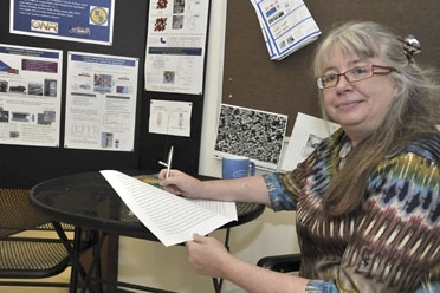Page 50 • (1,155 results in 0.016 seconds)
-
Link to Geologic Field Experience
While you’re a Earth Science Student at PLU!Geologic Field ExperienceLink to Geologic Field ExperienceResearch OpportunitiesLink to Natural Sciences Undergraduate Research Program These are PLU-based research opportunities with your Earth Science faculty! The application process typically begins in February for opportunities the following summer. Discuss your interests with your faculty to determine what positions might be available and helpful to you. 2020 Summer Research at Mount Rainier’s
-
According to the CITI site, this training takes ~4 hours on average to complete, so allow adequate time for completion before you intend to submit.
, identify yourself as a “Principal Investigator” or “Co-Investigator” (or any other appropriate role). For Office Phone, you may use the Division of Social Sciences number: 253-535-7669. For Step 7, Question 1, select “Social/Behavioral Investigators and Key Personnel.” For Question 2, DO NOT CHECK ANY OF THE BOXES. For Questions 3 and 5, please check, “Not at this time.” For Question 4, do not select anything. During registration, when asked which course you would like to take, select ONLY “Social
-

Researcher looks at how climate change leads to innovative science On Sept. 7, the PLU Chemistry department will host a seminar by Debra Rolison in Morken 103 from 12:30-1:35 pm. In her presentation, “How Subversion, Revolution, and Climate Change Lead to Innovative Science–Enhancing Electrochemical Energy…
September 5, 2012 Researcher looks at how climate change leads to innovative science On Sept. 7, the PLU Chemistry department will host a seminar by Debra Rolison in Morken 103 from 12:30-1:35 pm. In her presentation, “How Subversion, Revolution, and Climate Change Lead to Innovative Science–Enhancing Electrochemical Energy Storage on the Macroscale via Architectural Design on the Nanoscale,” Rolison will share her passion for empowering women and minorities in the sciences, and will give an
-
Special Thank You SPECIAL ACKNOWLEDGEMENTS: The following individuals are recognized for their extraordinary assistance and counsel in planning for the 2012 symposium. Loren J.
Planning Team Special Thank You SPECIAL ACKNOWLEDGEMENTS: The following individuals are recognized for their extraordinary assistance and counsel in planning for the 2012 symposium. Loren J. Anderson, President, Pacific Lutheran University Joel E. Baker, Port of Tacoma Chair, Environmental Sciences, University of Washington Tacoma Cameron D. Bennett, Dean School of Arts and Communication, Pacific Lutheran University Board of Directors, The Thor Heyerdahl Institute, Knut Phil, Chair Beate Bjørge
-
The Optometry Admission Test (OAT) is a standardized, 4-hour examination designed to measure general academic ability and comprehension of scientific information.
. Each test results in a numerical score of 200-400. The results are scaled such that a score of 300 represents the average national performance. The four tests are as follows: Survey of Natural Sciences = 90 minutes, 100 questions – 40 questions cover biology, 30 questions cover general chemistry, and 30 questions cover organic chemistry Reading Comprehension = 50 minutes, 40 questions – three reading passages each with 13 or 15 questions about each passage Physics = 50 minutes, 50 questions
-
Physician assistants, also known as PAs, practice medicine on a team under the direction of physicians and/or surgeons.
based on experience and education by the individual, as well as state law. To become a PA, a student must graduate from an accredited PA program. The typical entering student has a bachelor’s degree and approximately four years of health care experience. The average PA program takes 27 months to complete. Subjects covered in PA school include anatomy, physiology, medical ethics, pathology, pharmacology, biochemistry, microbiology, behavioral sciences, physical diagnosis and differential diagnosis
-
The Optometry Admission Test (OAT) is a standardized, 4-hour examination designed to measure general academic ability and comprehension of scientific information.
. Each test results in a numerical score of 200-400. The results are scaled such that a score of 300 represents the average national performance. The four tests are as follows: Survey of Natural Sciences = 90 minutes, 100 questions – 40 questions cover biology, 30 questions cover general chemistry, and 30 questions cover organic chemistry Reading Comprehension = 50 minutes, 40 questions – three reading passages each with 13 or 15 questions about each passage Physics = 50 minutes, 50 questions
-
Physician assistants, also known as PAs, practice medicine on a team under the direction of physicians and/or surgeons.
based on experience and education by the individual, as well as state law. To become a PA, a student must graduate from an accredited PA program. The typical entering student has a bachelor’s degree and approximately four years of health care experience. The average PA program takes 27 months to complete. Subjects covered in PA school include anatomy, physiology, medical ethics, pathology, pharmacology, biochemistry, microbiology, behavioral sciences, physical diagnosis and differential diagnosis
-
The President of the university, ex-officio Three Bishops of the synods of Region 1 of the Evangelical Lutheran Church in America No less than one-half of the total number of Regents are from the
Lutheran Church, KirklandBothell, Wash. SalvadorMungia '81Attorney, Gordon Thomas HoneywellTacoma, Wash. ArneNess '72DentistSammamish, Wash. SheilaRadford-HillChief Diversity Officer, Rosary College of Arts and Sciences, Dominican University (retired)River Forest, Illinois Thomas Saathoff '87Vice President, Strategy and Portfolio Management, Hewlett-PackardRidgefield, Wash. LaurieSoine '88Nurse Practitioner, Cardiology and Director, Advance Practice Nursing/Chief ARNP, University of Washington Medical
-
The STEM House is a community of students who are interested in engaging in conversations and activities about Science, Technology, Engineering, and/or Mathematics.
, Technology, Engineering, and/or Mathematics. This includes both those who intend to or are majoring in a STEM-related field as well as those who just love the sciences and want to remain immersed in a culture of like-interested students. The STEM House fosters an environment of curiosity and innovation.Great For Students Who ... enjoy studying and/or talking about Science, Technology, Engineering, and/or Mathematics are considering a majoring and/or a career in STEM-related fields are willing to commit
Do you have any feedback for us? If so, feel free to use our Feedback Form.


